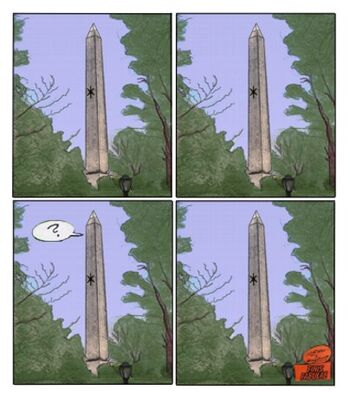*

An asterisk is a warning symbol used to indicate that small, nearly illegible type has settled at the bottom of a page due to buoyancy issues.
Minipixel molecules bond with one another in a process called full frontal copulation, whereby typefaces become smaller. Because text contains the same amount of information no matter the size, and it became smaller (i.e. the volume decreased), and density=matter/volume (matter here is in the form of energy (i.e. information, because energy is clearly required to process actual information)) the matter stays constant, and volume decreases, density must increase. This, in combination with the reduced drag, causes them to sink.
This creates several problems. First, bits of text were falling off the page, and if something had not been found to prevent this, large chunks of knowledge could have been lost forever, leading to the decline of civilization as we know it. Also, the bits of text falling off of pages would litter the floors, and people would slip on the small text, and then demand it be cleaned up, putting a large strain on cleaning personnel everywhere, and causing more and more people to become janitors, making large corporations lose their workforce, causing them to go bankrupt, and leading to the rapid decline of civilization.
Lastly, it required some form of early warning system, preventing any unnecessarily violent reading mishaps or desperate comprehensive confusion. To combat this dangerous potential threat, the Romans conceived a marvelous glyph the likes of which had never been seen by human eyes, but when scribes demanded overtime pay, the parties settled on a star, re-engineered to hold up the weighty text through a combination of balloons and space rays that attached the asterisk to the main text. This out of the way, the Romans got back to appropriating the whole of Greek culture, renaming it and claiming it as their own.
The earliest reference to the asterisk was on a parchment attributed to Cato the Censor, a Roman statesman and bibliographer of porn. On the parchment were the Latin words "Ad asterisk per aspera," which translates to "To the footnotes through difficulties." Cato the Censor was the first Roman to suggest using the asterisk in other situations, though he was promptly told to go f**k himself.
References[edit]
- ↑ Original French title: Huh haw haw, oui oui oui
| Letters of the Alphabet: | |||||||||||||||||||||||||||||||||||||||||||||||||||||||||||
|---|---|---|---|---|---|---|---|---|---|---|---|---|---|---|---|---|---|---|---|---|---|---|---|---|---|---|---|---|---|---|---|---|---|---|---|---|---|---|---|---|---|---|---|---|---|---|---|---|---|---|---|---|---|---|---|---|---|---|---|
| Sleep | Web browser | Prev | Play | Stop | Next | Mute | Volume up | Volume down | CTRL-ALT-DEL | Launch Nuke | LOL! | Produced by N o b o d y c a r e s ® | |||||||||||||||||||||||||||||||||||||||||||||||
| Esc | empty space | TV | F1 | F2 | F3 | F4 | F5 | F6 | F7 | F8 | F9 | F10 | F11 | F12 | F13 | PrtSc SysRq |
ScLk | Pause Break |
Lose Weight | ||||||||||||||||||||||||||||||||||||||||
| ~ ` |
! 1 |
@ 2 |
£ 3 |
$ 4 |
% 5 |
^ 6 |
& 7 |
* 8 |
( 9 |
) 0 |
_ - |
+ = |
←Bkspc | Ins | Home | PgUp | Num | / | * | - | |||||||||||||||||||||||||||||||||||||||
| Tab↔ | Q | W | E | R | T | Y | U | I | O | P | { [ |
} ] |
| \ |
Del | End | PgDn | 7 | 8 | 9 | + | |||||||||||||||||||||||||||||||||||||||
| Caps | A | S | D | F | G | H | J | K | L | : ; |
" ' |
←Enter | Oh, SHIT! | Any | Duh | 4 | 5 | 6 | |||||||||||||||||||||||||||||||||||||||||
| ↑Shift | Z | X | C | V | B | N | M | < , |
> . |
? / |
↓Shift | ↑ | 1 | 2 | 3 | Ent | |||||||||||||||||||||||||||||||||||||||||||
| Ctrl | FN | Alt | s p a c e b a r | Alt Gr | ⌘ | Ctrl | ← | ↓ | → | 0 | . | ||||||||||||||||||||||||||||||||||||||||||||||||
